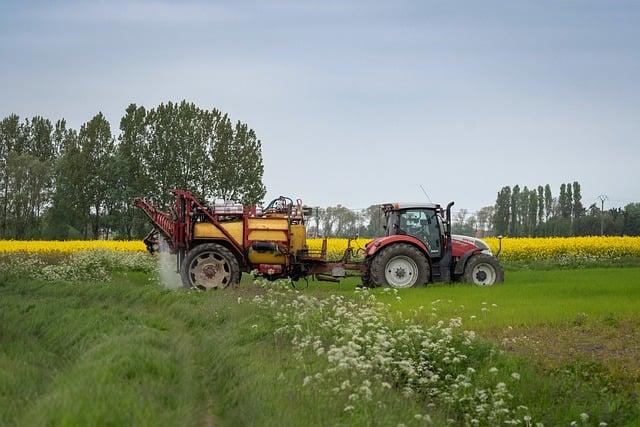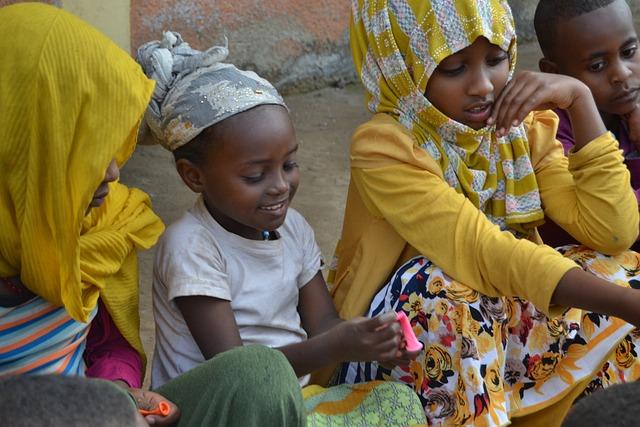In a significant move to empower and educate the next generation of agricultural leaders, African youth recently gathered for a series of formation sessions organized by Via Campesina across South Africa, Ethiopia, and Mauritius. These sessions aimed to deepen the understanding of sustainable farming practices, land rights, and food sovereignty among young participants, fostering a new wave of activists dedicated to transforming the continent’s agricultural landscape. As the impacts of climate change and economic disparity become increasingly pronounced, the involvement of youth is crucial in shaping resilient agricultural systems and advocating for policies that promote social justice and environmental sustainability. This article delves into the objectives and outcomes of these formation sessions, highlighting the pivotal role of young voices in the fight for a more equitable and sustainable future for Africa.
African Youth Engage in Empowering Formation Sessions Across Three Nations
In a series of transformative gatherings, young leaders from South Africa, Ethiopia, and mauritius have come together to engage in empowering formation sessions. These initiatives, organized by Via Campesina, aim to equip the participants with essential skills and knowledge to address pressing social and economic issues in their communities. Through interactive workshops, they focused on topics such as agricultural sustainability, youth leadership, and community organizing. The sessions also provided a platform for the youth to share their experiences and strategies, fostering a spirit of collaboration and innovation across borders.
The formation sessions highlighted the diverse challenges faced by the youth in each country, yet they shared a common goal of creating a more equitable future. Participants left with not only a deeper understanding of their roles as change-makers but also practical tools to implement new initiatives in their respective communities. Key takeaways included:
- Collaborative Strategies: Building networks between youth organizations.
- Advocacy Skills: Techniques for effective lobbying and policy influence.
- Access to Resources: sharing knowledge about grants and funding opportunities.

Exploring the Impact of Via Campesina’s Initiatives on Youth Development
The recent formation sessions held across South Africa,ethiopia,and Mauritius have catalyzed significant developments among the African youth,illustrating Via Campesina’s commitment to empowering the next generation.These initiatives are not merely educational; they serve as platforms for young participants to exchange ideas, learn sustainable agricultural practices, and understand the importance of food sovereignty. By engaging in these collaborative environments, youth from diverse backgrounds are able to:
- Enhance their skills in agroecology and sustainable farming techniques.
- Foster community ties that promote collective action and resilience.
- Develop leadership qualities necessary for advocating for their rights and those of their communities.
Moreover,these formation sessions offer an invaluable prospect for participants to connect with like-minded individuals and organizations,broadening their network and support systems. The structured approach allows for an exchange of local knowledge which is crucial for adapting global strategies to fit local contexts. Table 1 below summarizes some of the critical outcomes from these sessions, highlighting their direct impact on youth engagement and community involvement.
| Session Location | Participants Engaged | Key Outcome |
|---|---|---|
| South Africa | 150 | Established community gardens |
| Ethiopia | 120 | Formed youth cooperatives |
| Mauritius | 100 | Implemented sustainable farming workshops |

Strengthening Agricultural Knowledge and Skills Among Young People in South Africa
In a groundbreaking initiative, young people from South Africa, Ethiopia, and Mauritius are participating in comprehensive formation sessions designed to enhance their agricultural expertise and skills. These sessions aim to empower the youth by providing them with the necessary tools and knowledge to thrive in the agricultural sector, which is vital for economic growth and food security in the region. The curriculum focuses on a variety of key areas, emphasizing practical and theoretical understanding:
- Agri-buisness Management: Understanding the intricacies of running a accomplished farm or agro-enterprise.
- Sustainable Farming Practices: Implementing environmentally friendly techniques to boost productivity.
- Modern Technology in Agriculture: Exploring innovations like precision farming and digital tools.
Moreover, the formation sessions also encourage collaboration and networking among participants, fostering a community of future agricultural leaders. Through workshops, hands-on training, and mentorship opportunities, attendees are empowered to become change-makers in their local communities. The impact of these sessions is underscored in the following table, which highlights the key outcomes expected:
| Outcome | Description |
|---|---|
| Increased Knowledge | Participants gain essential agricultural knowledge pertinent to regional challenges. |
| Skill Development | workshops enhance practical skills in crop production and livestock management. |
| Networking Opportunities | Fosters connections among young farmers, creating potential partnerships. |

Ethiopia’s Role in Fostering Collaborative Learning and Sustainable Practices
Ethiopia has emerged as a pivotal player in nurturing collaborative learning and sustainable practices among Africa’s youth.The country‚Äôs rich agrarian heritage and diverse ecosystems provide a unique backdrop for fostering an understanding of sustainable agriculture,which is integral to the region‚Äôs economic resilience. Through various initiatives, Ethiopian organizations and educational platforms emphasize the importance of community-based learning, enabling young individuals to share knowledge and collaborate on innovative solutions. This grassroots approach not only empowers youths but also strengthens their ties with local agricultural practices, ensuring that sustainability becomes a shared duty.
The formation sessions held in Ethiopia exemplify this commitment to fostering an inclusive learning habitat. Participants engage in interactive workshops and discussion forums that encourage the exchange of ideas on sustainable farming techniques,fair trade,and environmental preservation. The emphasis on localized practices allows for the integration of traditional agricultural wisdom with modern techniques, promoting a holistic approach to food security.Notable areas of focus during these sessions include:
- Permaculture design principles
- Crop rotation and biodiversity
- Water conservation methods
- Community seed banks
This collaborative effort aims to equip the next generation with not only practical skills but also a sense of agency in addressing food sovereignty and environmental challenges within their communities.

Harnessing Mauritius as a model for Youth-Led Agricultural Innovation
The vibrant island nation of Mauritius has emerged as a beacon for youth-led agricultural innovation, exemplifying how young leaders can drive sustainable agricultural practices in Africa. This initiative, strongly supported by regional networks, empowers young farmers to engage with modern agricultural techniques, blending traditional wisdom with cutting-edge technology. Participants from the recent formation sessions observed how Mauritius focuses on sustainable farming methods, agroecology, and the promotion of community-supported agriculture. By leveraging local resources and fostering resilience against climate change, the youth are encouraged to rethink food systems and agricultural processes tailored to their unique environments.
Key initiatives from Mauritius that inspire young agricultural innovators include:
- Training and Capacity Building: Offering workshops that equip youth with the necessary skills to adopt innovative practices.
- Access to Funding: Creating pathways for micro-loans and grants to support new farming ventures.
- Mentorship Programs: Connecting youth with experienced farmers and agricultural experts to foster guidance and support.
- Collaborative Projects: Encouraging teamwork among young farmers to tackle challenges collectively and share resources.
As nations look to replicate this successful model, it’s essential to consider the frameworks set in Mauritius for optimal impact. The following table summarizes the essential components of the mauritian agricultural innovation model:
| Component | Description |
|---|---|
| Innovative Practices | Integration of technology with traditional farming techniques. |
| Community Engagement | Building networks of young farmers for mutual support. |
| Policy Support | Government initiatives aimed at empowering youth in agriculture. |
| Market Access | Facilitating entry into local and international markets. |

Recommendations for Enhancing Youth Participation in Agricultural Advocacy and Leadership
To effectively enhance youth participation in agricultural advocacy and leadership, it is crucial to engage young individuals through a multifaceted approach. Capacity building programs can be organized to equip youth with the necessary skills in advocacy, negotiation, and leadership. These initiatives should focus on practical training targeting both agricultural sustainability and socio-political aspects of farming. Furthermore, fostering collaborative networks among young agriculturalists will amplify their voices and create a platform for sharing innovative ideas. Establishing youth-led forums can further strengthen their influence in policy discussions, ensuring their perspectives are represented in critical dialogues.
Additionally, integrating technology into advocacy efforts can significantly broaden outreach and engagement.By utilizing social media platforms and mobile apps, young farmers can connect with peers, share knowledge, and mobilize support for issues affecting their communities. Mentorship programs linking experienced leaders with emerging youth advocates could provide invaluable guidance and empowerment in navigating the agricultural sector. The following table outlines essential strategies to consider for fostering youth involvement in agricultural leadership:
| Strategy | Description |
|---|---|
| skills Training | Workshops to develop advocacy and leadership skills. |
| networking events | Creating platforms for collaboration among young farmers. |
| Technological Integration | Using social media for broader outreach and engagement. |
| Mentorship Initiatives | Connecting youth with experienced leaders in agriculture. |

In Summary
the participation of African youth in formation sessions across South Africa, Ethiopia, and Mauritius marks a significant step towards empowering the next generation of leaders in the agricultural sector. These sessions, organized by Via Campesina, highlight the importance of community engagement, sustainable farming practices, and the crucial role that young people play in shaping the future of food sovereignty on the continent. As these participants return to their communities, they carry with them not only newly acquired knowledge and skills but also a renewed sense of purpose and responsibility. Their engagement in these formative experiences underscores the necessity of nurturing youth involvement in agriculture, ultimately fostering resilience and innovation in response to the myriad challenges posed by climate change and economic instability. The momentum generated by such initiatives serves as a reminder that the future of African agriculture lies in the hands of its youth, whose voices and actions will be instrumental in driving sustainable development and food security across the region.







